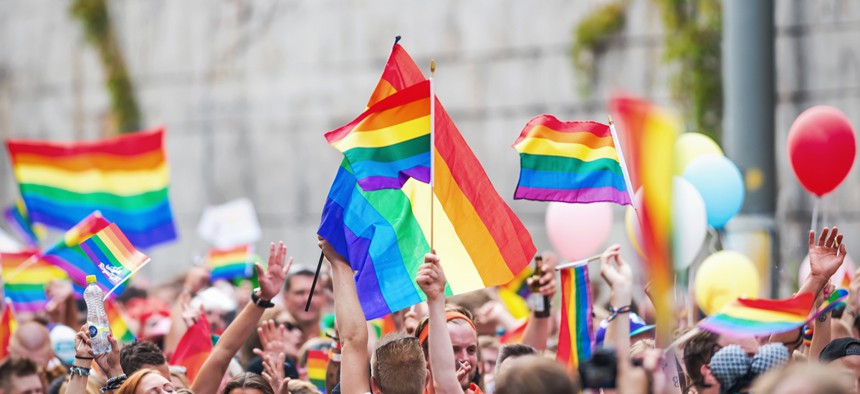Rating LGBTQ Equality in American Cities

Ranking metrics include non-discrimination laws, access for all genders to single-user public restrooms and protecting LGBTQ youth from bullying. shutterstock

Connecting state and local government leaders
The Municipal Equality Index rates 506 cities on 49 different metrics.
A record-breaking 78 cities received perfect scores on the 2018 Municipal Equality Index, a Human Rights Campaign ranking system that measures “LGBTQ inclusion in municipal law, policy and services.”
“From San Antonio, Texas to Brookings, South Dakota—this year’s MEI again proves that there are no barriers to municipal LGBTQ equality for a city with dedicated, pro-equality elected officials,” HRC President Chad Griffin said in a statement. “Forward-looking leaders across the U.S. are stepping up, protecting their youth from so-called ‘conversion therapy,’ increasing anti-bullying protections, ensuring transgender city employees have access to inclusive health care benefits and protecting LGBTQ people from discrimination in all areas of life.”
The index rates cities on 49 different criteria, including non-discrimination laws, employment tendencies, municipal services, law enforcement, and leadership’s public positions on equality. A perfect score totals 100, a grade given last year to 68 cities. This year’s index, the seventh, rates 506 cities, including all 50 state capitals, the 200 largest cities in the country and the five largest municipalities in each state, among others.
The 2018 index added several new benchmarks, including access for all genders to single-user public restrooms, protecting LGBTQ youth from bullying and if they have policies regarding conversion therapy, a largely discredited practice that attempts to stop people from being lesbian, gay, bisexual or transgender. The index also now deducts points for laws that include provisions that license discrimination against the LGBTQ community.
Across the country, cities made significant progress on transgender equality, according to the report. Public employees in 147 cities are offered benefits that cover transgender health-care needs, up from 111 last year, 66 in 2015 and five in 2012.
Fifty-six cities expanded their equal-opportunity employment policies to include sexual orientation or gender identity, and 20 extended the same employment non-discrimination requirements to businesses they contract with for goods or services. And 97 cities offer equal benefits to same- or different-sex domestic partners of city employees and their legal dependents.
Nationally, the overall average score rose by a point for the second year in a row, from 57 to 58. Progress continued even for cities—103 of them—in states without comprehensive anti-discrimination laws protecting LGBTQ people. The average score for those cities was 83 points, and 34 scored a perfect 100. Forty-six of them scored more than 85 points, earning the designation of “all-star cities,” including Huntington, West Virginia; Birmingham, Alabama; Missoula, Montana; Juneau, Alaska; Pittsburgh and New Orleans.
Inclusive policies have been shown to improve economic development, the report says, so it’s not surprising that some cities are enacting progressive legislation ahead of their state legislatures.
“Local officials work to ensure that residents and visitors have access to meaningful LGBTQ-inclusive protections not only because it is the right thing to do, but because they are keenly aware that when everyone is welcomed and afforded equal dignity and respect, prospective residents and investors take notice,” it says. “Communities that solidify their value for LGBTQ inclusion in enforceable anti-discrimination laws and policies are better situated to attract the nation’s top talent and the businesses looking to employ them.”
Kate Elizabeth Queram is a Staff Correspondent for Government Executive’s Route Fifty and is based in Washington, D.C.

NEXT STORY: Inspect a drainage ditch? There’s an app for that




